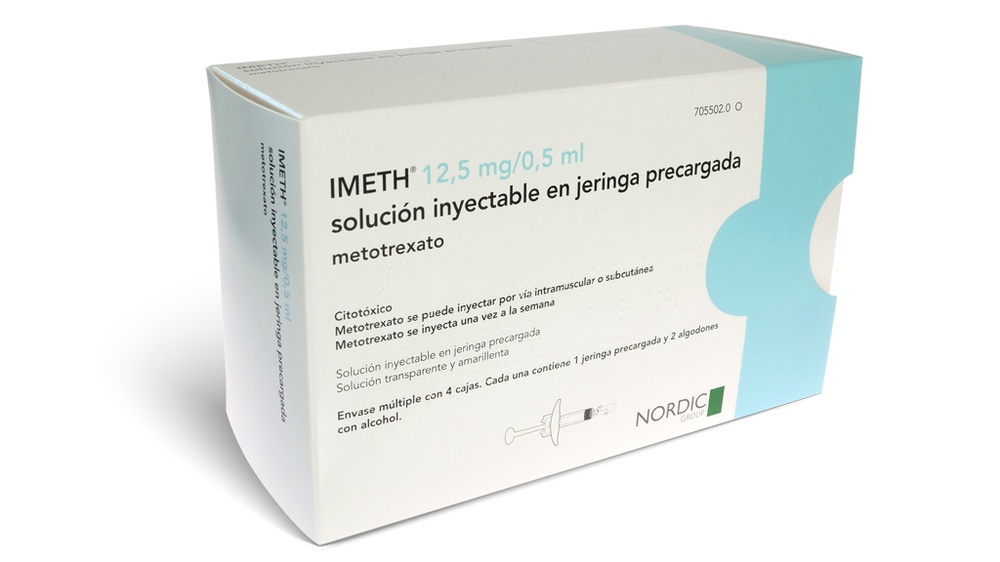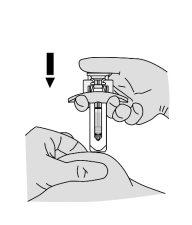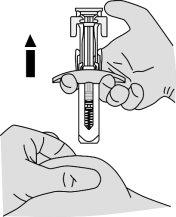

IMETH 12,5 mg/0,5 ml Solução injetável em seringa pré-carregada


Como usar IMETH 12,5 mg/0,5 ml Solução injetável em seringa pré-carregada
Introdução
Prospecto: informação para o utilizador
IMETH12,5mg/0,5 mlsolução injetável em seringa pré-carregada
Metotrexato
Leia todo o prospecto atentamente antes de começar a usar este medicamento, porque contém informações importantes para si.
- Conserva este prospecto, porque pode ter que voltar a lê-lo.
- Se tiver alguma dúvida, consulte o seu médico ou farmacêutico.
- Este medicamento foi prescrito apenas para si, e não deve dá-lo a outras pessoas, mesmo que tenham os mesmos sintomas que si, porque pode prejudicá-las.
- Se experimentar efeitos adversos, consulte o seu médico ou farmacêutico, mesmo que se trate de efeitos adversos que não aparecem neste prospecto. Ver seção 4.
Conteúdo do prospecto
- O que é IMETH e para que é utilizado
- O que precisa saber antes de começar a usar IMETH
- Como usar IMETH
- Possíveis efeitos adversos
- Conservação de IMETH
- Conteúdo do envase e informações adicionais
1. O que é IMETH e para que é utilizado
Imeth é um medicamento que tem as propriedades seguintes:
- Interfere no crescimento de certas células do corpo que se multiplicam rapidamente (agente antitumoral).
- Reduz as reações indesejadas do próprio mecanismo de defesa do corpo (imunossupressor).
- Têm efeitos anti-inflamatórios.
Imeth está indicado para o tratamento de:
- Artrite reumatoide ativa em pacientes adultos.
- Formas poliartríticas de artrite idiopática juvenil ativa e grave quando a resposta aos medicamentos anti-inflamatórios não esteroideos (AINE) tenha sido inadequada.
- Psoríase incapacitante recalcitrante grave, que não responde adequadamente a outras formas de tratamento como fototerapia, PUVA e retinoides, e psoríase grave que afeta as articulações (artrite psoriásica) em pacientes adultos.
- Doença de Crohn leve a moderada em pacientes adultos refratários ou intolerantes a tiopurinas.
2. O que precisa saber antes de começar a usar IMETH
Aviso importante em relação à administração de metotrexato:
Metotrexato só deve ser utilizado uma vez por semana para o tratamento de doenças reumáticas ou doenças da pele. A administração inadequada de metotrexato pode causar efeitos adversos graves, incluindo um desfecho mortal. Leia a seção 3 deste prospecto com muita atenção.
Pergunte ao seu médico ou farmacêutico se tiver alguma dúvida antes de utilizar Imeth.
Não useIMETH:
- Se for alérgico (hipersensível) ao metotrexato ou a qualquer um dos outros componentes deste medicamento (ver seção 6).
- Se tiver alguma doença renal importante (o seu médico decide a gravidade da doença).
- Se tiver alguma doença hepática importante (o seu médico decide a gravidade da doença).
- Se tiver distúrbios do sistema hematopoiético.
- Se o seu consumo de álcool for elevado.
- Se tiver o sistema imunológico alterado.
- Se tiver uma infecção grave ou existente; p. ex., tuberculose e VIH.
- Se tiver úlceras gastrointestinais.
- Se estiver grávida ou em período de amamentação (ver seção "Gravidez, amamentação e fertilidade").
- Se receber ao mesmo tempo vacinas com microorganismos vivos.
Advertências e precauções
Foi notificado com metotrexato hemorragia pulmonar aguda em pacientes com doença reumatológica subjacente. Se observar sangue ao escupir ou tossir, deve entrar em contacto de forma imediata com o seu médico.
Se si, o seu parceiro ou o seu cuidador notam a aparição ou um agravamento de sintomas neurológicos, como fraqueza muscular geral, alteração da visão, mudanças no pensamento, na memória e na orientação que geram confusão e mudanças de personalidade, contacte com o seu médico imediatamente porque estes podem ser sintomas de uma infecção cerebral grave muito rara denominada leucoencefalopatia multifocal progressiva (LMP).
O metotrexato pode fazer com que a pele seja mais sensível à luz solar. Evite o sol intenso e não utilize camas de bronzeado nem lâmpadas ultravioletas sem conselho médico. Para proteger a pele do sol intenso, use roupas adequadas ou utilize um protetor solar com um fator de proteção alto.
Consulte o seu médico antes de começar a usar Imeth
- Se tiver diabetes mellitus tratada com insulina.
- Se tiver infecções crônicas inativas (p. ex. tuberculose, hepatite B ou C, herpes [herpes zóster]).
- Se tiver ou tenha tido alguma doença hepática ou renal.
- Se tiver problemas com a função pulmonar.
- Se tiver sobrepeso grave.
- Se tiver acúmulo anormal de líquido no abdômen ou na cavidade situada entre os pulmões e a parede torácica (ascite, derrame pleural).
- Se estiver desidratado ou padeça de algum distúrbio que possa causar desidratação (vômitos, diarreia, estomatite).
O tratamento deve ser administrado uma vez por semana.
A administração incorrecta de metotrexato pode causar efeitos adversos graves, incluindo efeitos adversos potencialmente letais. Leia atentamente a seção 3 deste prospecto.
Se teve problemas cutâneos após a radioterapia (dermatite induzida por radiação) e queimaduras solares, estas afecções podem voltar a aparecer durante o tratamento com metotrexato (reação de memória).
Uso em crianças, adolescentes e pacientes de idade avançada
As instruções de administração dependem do peso corporal do paciente. Não se recomenda o uso em crianças menores de 3 anos devido a que a experiência com este grupo de idade é insuficiente.
As crianças e pacientes de idade avançada em tratamento com Imeth devem ser submetidos a um controlo médico particularmente frequente para identificar o mais cedo possível os possíveis efeitos adversos.
Um médico deve monitorizar estreitamente os pacientes de idade avançada em tratamento com metotrexato para detectar o mais cedo possível os possíveis efeitos adversos.
Nos pacientes de idade avançada, em caso de insuficiência hepática e insuficiência renal relacionadas com a idade e de reservas baixas de ácido fólico no organismo, é necessária uma dose relativamente baixa de metotrexato.
Medidas de precaução especiais durante o tratamento com Imeth
Imeth só deve ser prescrito por médicos com experiência suficiente no tratamento com metotrexato da doença que padece.
O metotrexato afeta de forma temporária a produção de espermatozoides e óvulos. O metotrexato pode causar abortos e defeitos de nascimento graves. Se si é mulher, deve evitar ter um bebê se estiver a receber metotrexato naquele momento e durante pelo menos 6 meses após ter finalizado o tratamento com metotrexato. Se si é homem, deve evitar ter um filho se estiver a receber metotrexato naquele momento e durante pelo menos 3 meses após finalizar o tratamento.
Ver também seção «Gravidez, amamentação e fertilidade».
As alterações cutâneas causadas pela psoríase podem piorar durante o tratamento com Imeth se ao mesmo tempo se expuser à radiação UV.
Explorações de seguimento recomendadas e precauções:
Mesmo quando se usa metotrexato em doses baixas, podem aparecer efeitos adversos graves. Para detectá-los a tempo, o seu médico realizará explorações de controlo e testes de laboratório.
Antes de iniciar o tratamento:
Antes de iniciar o tratamento, será realizado um análise de sangue para determinar se tem células sanguíneas suficientes. Também será realizado um análise de sangue para comprovar a função hepática e descobrir se padece hepatite. Além disso, também serão comprovados os níveis de albúmina sérica (uma proteína sanguínea), o estado da hepatite (infecção hepática) e a função renal. O médico também pode decidir realizar outras provas hepáticas, que podem consistir na obtenção de imagens do fígado ou na tomada de uma pequena amostra de tecido do fígado para realizar uma exploração mais exaustiva. Também é possível que o médico comprove se padece tuberculose e lhe realize uma radiografia torácica ou uma prova da função pulmonar.
Durante o tratamento:
O médico pode realizar as seguintes explorações:
- Exploração da cavidade oral e da faringe para detectar mudanças na mucosa, como inflamação ou úlceras.
- Análise de sangue/hemograma com recuento de células sanguíneas e medição dos níveis séricos de metotrexato.
- Análise de sangue para controlar a função hepática.
- Provas de imagem para controlar o estado do fígado.
- Obtenção de uma pequena amostra de tecido do fígado para realizar uma exploração mais exaustiva.
- Análise de sangue para controlar a função renal.
- Controlo das vias respiratórias e, se for necessário, prova de função pulmonar.
É muito importante que se apresente para realizar estas explorações programadas.
Se os resultados de algumas destas provas forem anómalos, o seu médico ajustará o tratamento de acordo.
Outros medicamentos e Imeth
Comunique ao seu médico ou farmacêutico se estiver a utilizar, tenha utilizado recentemente ou possa ter que utilizar qualquer outro medicamento, incluindo os medicamentos adquiridos sem receita e plantas medicinais ou produtos naturais.
É especialmente importante que informe o seu médico se estiver a usar:
- Outros tratamentos para a artrite reumatoide ou a psoríase, como leflunomida, sulfassalazina (também utilizada para a colite ulcerosa), aspirina, fenilbutazona ou amidopirina.
- Álcool (deve ser evitado).
- Vacinas com microorganismos vivos.
- Azatioprina (utilizada para prevenir o rejeição após o transplante de um órgão).
- Retinoides (utilizados para tratar a psoríase e outras doenças cutâneas).
- Medicamentos anticonvulsivantes (para prevenir as convulsões).
- Tratamentos contra o cancro.
- Barbitúricos (injeção para dormir).
- Tranquilizantes.
- Anticonceptivos orais.
- Probenecid (contra a gota).
- Antibióticos.
- Pirimetamina (utilizada para prevenir e tratar a malária).
- Preparados vitamínicos que contenham ácido fólico.
- Inibidores da bomba de protões (utilizados para tratar a acidez de estômago grave ou as úlceras).
- Teofilina (utilizada para tratar a asma).
- Metamizol (sinônimos: novaminsulfona e dipirona) (medicamento para a dor intensa e/ou a febre).
Uso deIMETHcom alimentos,bebidas e álcool
Durante o tratamento com Imeth, deve evitar o consumo de álcool e o consumo excessivo de café, refrigerantes com cafeína e chá preto.
Também certifique-se de ingerir uma grande quantidade de líquidos durante o tratamento com Imeth porque a desidratação (redução da água corporal) pode aumentar a toxicidade de Imeth.
Gravidez, amamentação e fertilidadeSe estiver grávida ou em período de amamentação, acredite que possa estar grávida ou tem intenção de ficar grávida, consulte o seu médico antes de utilizar este medicamento.
Gravidez
Não utilize Imeth durante a gravidez ou se está a tentar ficar grávida. O metotrexato pode causar defeitos de nascimento, danificar o feto ou provocar abortos. Está associado a malformações do crânio, da face, do coração e dos vasos sanguíneos, do cérebro e dos membros. Por isso, é muito importante que não se administre metotrexato a pacientes grávidas ou que tenham previsto ficar grávidas. Em mulheres em idade fértil deve ser excluída qualquer possibilidade de gravidez com as medidas oportunas, por exemplo, uma prova de gravidez antes de começar o tratamento. Deve evitar ficar grávida enquanto toma metotrexato e durante pelo menos 6 meses após suspender o tratamento, utilizando para isso métodos anticonceptivos fiáveis durante todo este tempo (ver também seção «Advertências e precauções»).
Se ficar grávida durante o tratamento ou suspeitar que possa estar grávida, consulte o seu médico o mais cedo possível. Deve ser oferecida informação sobre o risco de efeitos prejudiciais para a criança durante o tratamento.
Se desejar ficar grávida, consulte o seu médico, que pode encaminhá-la para um especialista para que a informe antes do início previsto do tratamento.
Amamentação
Não deve dar o peito durante o tratamento, porque metotrexato passa para o leite materno. Se o seu médico considerar que o tratamento com metotrexato é absolutamente necessário durante o período de amamentação, deve interromper a amamentação materna.
Fertilidade masculina
Os dados disponíveis não indicam um maior risco de malformações ou abortos se o pai tomar uma dose de metotrexato inferior a 30 mg/semana. No entanto, não se pode descartar por completo este risco. O metotrexato pode ser genotóxico, o que significa que pode causar mutações genéticas. O metotrexato pode afetar a produção de espermatozoides e causar defeitos de nascimento. Por isso, deve evitar gerar um filho ou doar sêmen enquanto toma metotrexato e durante pelo menos 3 meses após interromper o tratamento.
Condução e uso de máquinas
Durante o tratamento com Imeth podem aparecer efeitos adversos que afetam o sistema nervoso central, como cansaço e tonturas. Por isso, em alguns casos, pode ser afetada a capacidade para conduzir veículos e/ou utilizar máquinas. Se se sentir cansado ou tonto, não deve conduzir nem utilizar máquinas.
IMETH contém sódio
Este medicamento contém menos de 1 mmol de sódio (23 mg) por dose, ou seja, está essencialmente isento de sódio.
3. Como usar IMETH
Aviso importante sobre a dose de Imeth (metotrexato):
Use Imeth apenas uma vez por semanapara o tratamento da artrite reumatoide, artrite idiopática juvenil ativa, psoríase, artrite psoriásica e doença de Crohn. O uso excessivo de Imeth (metotrexato) pode ser mortal. Leia a seção 3 deste prospecto com muita atenção. Se tiver alguma dúvida, consulte seu médico ou farmacêutico antes de tomar este medicamento.
Siga exatamente as instruções de administração deste medicamento indicadas por seu médico. Em caso de dúvida, consulte novamente seu médico ou farmacêutico.
Imeth é administrado apenas uma vez por semana. Pode decidir, juntamente com seu médico, um dia adequado da semana para cada semana que receber sua injeção.
A administração incorreta de Imeth pode causar efeitos adversos graves, incluindo efeitos adversos potencialmente letais.
A dose normal é:
Posologia em pacientes com artrite reumatoide
A dose inicial recomendada é de 7,5 mg de metotrexato uma vez por semana. Imeth é administrado em uma única aplicação na forma de injeção sob a pele (ver seção "Método e duração da administração").
Se isso resultar inadequado e for bem tolerado, as doses de Imeth podem ser aumentadas. A dose média semanal é de 15-20 mg. Geralmente, não se deve exceder uma dose semanal de 25 mg de Imeth. Uma vez alcançados os resultados terapêuticos desejados, a dose deve ser reduzida, se possível, gradualmente até a dose eficaz de manutenção mais baixa possível.
Posologia em crianças e adolescentes menores de 16 anos com formas poliarticulares de artrite idiopática juvenil
A dose recomendada é de 10-15 mg/m2 de superfície corporal por semana. Em casos de resposta inadequada, a dose semanal pode ser aumentada até 20 mg/m2 de superfície corporal/semana. No entanto, devem ser realizados reconhecimentos médicos periódicos com mais frequência. Deve ser administrado por meio de uma injeção subcutânea (sob a pele).
Não se recomenda o uso em crianças menores de 3 anos devido à falta de experiência com este grupo etário.
Adultos com formas graves de psoríase vulgar ou artrite psoriásica
Recomenda-se administrar uma única dose de teste de 5-10 mg para avaliar os possíveis efeitos nocivos. Esta dose pode ser administrada por via subcutânea (sob a pele).
Se uma semana após não se observaram mudanças no recuento sanguíneo, o tratamento deve continuar com uma dose de aproximadamente 7,5 mg. A dose pode ser aumentada gradualmente (em quantidades de 5-7,5 mg cada semana e controlando o recuento sanguíneo) até que se obtenham os resultados terapêuticos ideais. Geralmente, uma dose semanal de 20 mg pode estar associada a um aumento significativo da toxicidade. Não se deve exceder uma dose semanal de 30 mg. Uma vez alcançados os resultados terapêuticos desejados, a dose deve ser reduzida semanalmente até a dose eficaz de manutenção mais baixa possível para o paciente.
Posologia em pacientes adultos com doença de Crohn
A duração do tratamento será decidida pelo médico. O tratamento da doença de Crohn com Imeth é um tratamento de longo prazo.
- Tratamento de indução:
25 mg/semana administrados por via subcutânea.
A resposta ao tratamento pode ser esperada aproximadamente após 8 a 12 semanas.
- Tratamento de manutenção:
15 mg/semana administrados por via subcutânea.
Este medicamento não é indicado para pacientes pediátricos com doença de Crohn.
Pacientes com um distúrbio renal
Os pacientes com um distúrbio renal podem precisar de uma dose reduzida.
Método e duração da administração
O médico determinará a duração do tratamento. Imeth é injetado uma vez por semana. Recomenda-se especificar um dia determinado da semana como dia da injeção. Imeth é administrado na forma de injeção sob a pele. O tratamento da artrite reumatoide, artrite idiopática juvenil, psoríase vulgar e artrite psoriásica com Imeth é um tratamento de longa duração.
Artrite reumatoide
Geralmente, pode ser esperada uma melhoria dos sintomas após 4-8 semanas de tratamento. Os sintomas podem voltar a aparecer após a interrupção do tratamento com Imeth.
Formas graves de psoríase vulgar e artrite psoriásica (psoríase artropática)
A resposta ao tratamento pode ser esperada geralmente após 2-6 semanas. De acordo com o quadro clínico e as alterações dos parâmetros de laboratório, o tratamento deve ser continuado ou interrompido.
No início do tratamento, Imeth pode ser injetado pelo pessoal médico. No entanto, é possível que seu médico decida que você pode aprender a se injetar Imeth sozinho. Você receberá a formação adequada para isso. Em nenhuma circunstância deve tentar se injetar sozinho, a menos que tenha sido ensinado a fazê-lo.
Como se administrar uma injeção deIMETH
Se não souber como manipular a seringa, pergunte a seu médico ou farmacêutico. Não tente se injetar sozinho se não recebeu formação a respeito. Se não estiver seguro do que deve fazer, fale imediatamente com seu médico ou enfermeiro.
Antes de se injetarIMETH
- Verifique a data de validade do medicamento. Não o use se a data de validade tiver sido ultrapassada.
- Verifique se a seringa não está danificada e se o medicamento tem o aspecto de solução clara. Se não for assim, use outra seringa.
- Inspeccione a última zona de injeção para ver se a última injeção causou algum vermelhidão, mudança na cor da pele, inchaço, supuração ou dor persistente; se for assim, fale com seu médico ou enfermeiro.
- Decida onde vai injetar o medicamento. Mude de zona de injeção cada vez que administrar uma injeção.
Instruções sobre como se injetarIMETH
- Lave bem as mãos com água e sabão.
- Sente-se ou deite-se em uma posição confortável e relaxada. Certifique-se de que pode ver a zona da pele na qual efetuará a injeção.
- A seringa está pré-carregada e pronta para uso. Abra o blister, destampando completamente a camada superior do blister como mostrado.

- Precaução: NÃO segure o produto pelo êmbolo ou pelo capuchão da agulha. Retire a seringa da caixa segurando-a pelo corpo como mostrado na imagem abaixo.

- Inspeccione visualmente a seringa. Deve poder ver um líquido amarelo através da janela de visualização. É possível que veja uma pequena bolha de ar, isso não afetará a injeção e não causará nenhum dano.
- Escolha um local de injeção e desinfete-o com a torunda impregnada com álcool que vai incluída. Leva entre 30 e 60 segundos para fazer efeito. São consideradas zonas adequadas para a injeção a pele da parte da frente da parede abdominal e a pele da parte da frente do músculo da coxa.
- Enquanto segura o corpo da seringa, retire o tampão.

NÃOpressione o êmbolo antes de se autoinjetar para eliminar as bolhas de ar. Se fizer isso, pode ocorrer uma perda de medicamento. Depois de retirar o tampão, mantenha a seringa na mão. Evite que a seringa entre em contato com qualquer outro elemento. Isso permite garantir que a agulha permaneça limpa.
- Segure a seringa com a mão com a qual escreve (como se fosse um lápis) e, com a outra mão, forme um dobra na pele puxando suavemente a pele no local da injeção com os dedos índice e polegar. Certifique-se de segurar o dobra da pele durante toda a injeção.
- Desloque a seringa em direção ao dobra da pele (local da injeção) com o protetor da agulha apontando diretamente para o local da injeção. Insira a agulha até o fundo no dobra da pele.
- Pressione o êmbolo para baixo com o dedo até que a seringa se esvazie. Dessa forma, a medicação será injetada sob a pele.

- Retire a agulha; para isso, extraia-a em linha reta. O protetor de segurança da seringa cobrirá automaticamente a agulha para evitar lesões por picadas de agulha. Agora pode soltar o dobra da pele.

Nota: o sistema de segurança que libera o protetor de segurança só pode ser ativado quando a seringa for esvaziada ao pressionar o êmbolo até o final. Para evitar hematomas, não esfregue a zona de injeção após se injetar.
- Descarte a seringa no contêiner de objetos pontiagudos fornecido. Feche bem a tampa do contêiner e coloque-o fora do alcance das crianças. Em caso de contato acidental do metotrexato com a pele ou os tecidos moles, enxágue a zona com água abundante. Quando o contêiner estiver cheio, entregue-o a seu médico ou enfermeiro para que o descarte. Não o jogue no lixo.
Se usar maisIMETHdo que o necessário
Siga as recomendações de administração de seu médico. Não mude a dose por conta própria.
Se suspeita que você (ou outra pessoa) administrada uma quantidade excessiva de Imeth, entre em contato com seu médico ou vá imediatamente ao hospital mais próximo. Eles decidirão quais medidas terapêuticas são necessárias com base na gravidade da intoxicação.
Uma sobredose de metotrexato pode causar reações tóxicas graves. Os sintomas de sobredose podem incluir hematomas ou hemorragias, fraqueza incomum, úlceras na boca, náuseas, vômitos, fezes negras ou com sangue, tosse com sangue ou vômito semelhante a borras de café, e diminuição da produção de urina. Ver também a seção 4.
Leve o frasco com o medicamento consigo se for ao médico ou a um hospital.
O antídoto em caso de sobredose é o folinato cálcico.
Se esquecer de usarIMETH
Não tome uma dose dupla para compensar as doses esquecidas, mas continue tomando a dose prescrita. Peça conselho a seu médico.
Se interromper o tratamento comIMETH
Não deve interromper ou suspender o tratamento com Imeth, a menos que tenha acordado com seu médico. Se suspeita de efeitos adversos graves, entre em contato imediatamente com seu médico.
Se tiver alguma outra dúvida sobre o uso deste medicamento, pergunte a seu médico ou farmacêutico.
4. Possíveis efeitos adversos
Assim como todos os medicamentos, este medicamento pode produzir efeitos adversos, embora nem todas as pessoas os sofram.
Informar imediatamente seu médico se apresentar fraqueza repentina; dificuldade para respirar; inchaço dos párpados, face ou lábios; erupção cutânea ou coceira (especialmente se afeta todo o corpo).
Efeitos adversos graves
Se desenvolver algum dos efeitos adversos seguintes, entre em contato imediatamente com seu médico:
- Dor pulmonar (os sintomas podem ser mal-estar geral, tosse irritante e seca, dificuldade para respirar, sensação de falta de ar em repouso, dor torácica ou febre).
- Sangue ao escupir ou tossir.
- Formação de bolhas ou descamação grave da pele.
- Hemorragias incomuns (incluindo vômitos com sangue) ou hematomas.
- Diarreia grave.
- Úlceras na boca.
- Fezes negras ou alcatrão.
- Sangue na urina ou fezes.
- Pequenas manchas vermelhas na pele.
- Febre.
- Coloração amarelada da pele (icterícia).
- Dor ou dificuldade para urinar.
- Sede e/ou necessidade de urinar com frequência.
- Ataques (convulsões).
- Perda de consciência.
- Visão borrada ou diminuição da visão.
Também foram comunicados os efeitos adversos seguintes:
Muito frequentes: | afetam mais de 1 pessoa em cada 10. |
Frequentes: | afetam de 1 a 10 pessoas em cada 100. |
Pouco frequentes: | afetam de 1 a 10 pessoas em cada 1.000. |
Raros: | afetam de 1 a 10 pessoas em cada 10.000. |
Muito raros: | afetam menos de 1 pessoa em cada 10.000. |
Frequência desconhecida: | não pode ser estimada a partir dos dados disponíveis. |
Muito frequentes:
Perda de apetite, náuseas (tonturas), vômitos, dor de barriga, inflamação e úlceras na boca e na garganta, e aumento das enzimas hepáticas.
Frequentes:
Formação reduzida de células sanguíneas com uma diminuição dos leucócitos e/ou eritrócitos e/ou plaquetas (leucopenia, anemia, trombocitopenia), dor de cabeça, cansaço, sonolência, inflamação dos pulmões (neumonia) com tosse seca não produtiva, dificuldade para respirar e febre, diarreia, erupção cutânea, vermelhidão da pele e coceira.
Pouco frequentes:
Diminuição do número de células sanguíneas e plaquetas, tontura, confusão, depressão, convulsões, inflamação dos vasos sanguíneos, dano pulmonar, úlceras e hemorragias no tubo digestivo, distúrbios hepáticos, diabetes, diminuição de proteínas no sangue, urticária (sozinha), reações semelhantes a queimaduras solares devido a uma maior sensibilidade da pele à luz solar, coloração marrom da pele, queda de cabelo, aumento dos nódulos reumáticos, herpes, psoríase dolorosa, dor articular ou muscular, osteoporose (redução da massa óssea), inflamação e úlceras na bexiga (possivelmente com presença de sangue na urina), dor ao urinar, reações alérgicas graves, inflamação e úlceras na vagina e cicatrização lenta das feridas.
Raros:
Inflamação do saco que rodeia o coração, líquido no saco que rodeia o coração, alteração grave da visão, flutuações do estado de ânimo, pressão arterial baixa, coágulos sanguíneos, dor de garganta, interrupção da respiração, asma, inflamação do tubo digestivo, fezes com sangue, inflamação das gengivas, digestão anormal, hepatite aguda (inflamação do fígado), mudanças de cor das unhas, acne, manchas vermelhas ou púrpura devido a sangramento de vasos, fraturas de ossos, insuficiência renal, diminuição ou ausência de urina, alterações de eletrólitos, formação defeituosa de esperma e alterações da menstruação.
Muito raros:
Infecções, insuficiência grave de medula óssea, insuficiência hepática, glândulas inflamadas, insônia, dor, fraqueza muscular, sensação de entorpecimento ou formigamento/sensibilidade menor do que o normal, alterações do gosto (sabor metálico), inflamação do revestimento do cérebro que causa paralisia ou vômitos, olhos vermelhos, dano na retina do olho, líquido nos pulmões, vômitos com sangue, febres, proteínas na urina, febre, perda de desejo sexual, problemas de ereção, infecção ao redor das unhas, complicação grave do tubo digestivo, furúnculos, vasos sanguíneos pequenos na pele, infecções por fungos, dano dos vasos sanguíneos da pele, fluxo vaginal, infertilidade e aumento das mamas nos homens (ginecomastia), distúrbios linfoproliferativos (aumento excessivo de glóbulos brancos).
Frequência não conhecida:
Algumas infecções do cérebro (leucoencefalopatia), hemorragia pulmonar, dano nos ossos da mandíbula (secundário a um aumento excessivo de glóbulos brancos), destruição do tecido no local da injeção, vermelhidão e descamação da pele, inchaço.
Quando se administra metotrexato por via intramuscular, com frequência podem ocorrer efeitos adversos locais (sensação de queimadura) ou danos (formação de abscessos estéreis, destruição do tecido gorduroso) na zona de injeção. A administração subcutânea de metotrexato é bem tolerada localmente. Apenas foram observadas reações cutâneas locais leves que diminuíram durante o tratamento.
Metotrexato pode provocar uma redução no número de leucócitos e pode fazer diminuir a resistência à infecção. Se experimenta uma infecção com sintomas como febre e deterioração grave do estado de saúde geral, ou febre com sintomas de infecção local como dor de garganta, faringite, dor de boca ou problemas urinários, deve ir imediatamente ao médico. Será realizado um exame de sangue para comprovar a possível redução de leucócitos (agranulocitose). É importante que informe seu médico sobre sua medicação.
Metotrexato pode causar efeitos adversos graves (em ocasões perigosos para a vida). Portanto, seu médico realizará exames para comprovar se aparecem anomalias no sangue (p. ex., leucócitos baixos, plaquetas baixas, linfoma) e alterações nos rins e no fígado.
Comunicação de efeitos adversosSe experimentar qualquer tipo de efeito adverso, consulte seu médico ou farmacêutico, mesmo que se trate de efeitos adversos que não aparecem neste prospecto. Também pode comunicá-los diretamente por meio do sistema nacional de notificação incluído no Sistema Espanhol de Farmacovigilância de Medicamentos de Uso Humano: www.notificaram.es. Mediante a comunicação de efeitos adversos, pode contribuir para fornecer mais informações sobre a segurança deste medicamento.
5. Conservação de IMETH.
Mantenha este medicamento fora da vista e do alcance das crianças.
Conservar a uma temperatura inferior a 25°C.
Guarde a seringa na caixa exterior para protegê-la da luz.
Não congelar.
Não use este medicamento após a data de validade que aparece na etiqueta da seringa pré-carregada e da caixa após CAD. A data de validade é o último dia do mês que se indica.
O produto deve ser usado imediatamente após aberto.
Não use Imeth se a solução não for transparente e contiver partículas.
Para um único uso. Descarte qualquer resto de solução não utilizada. Os medicamentos não devem ser jogados nos deságues ou no lixo. Deposite os envases e os medicamentos que não precisa no Ponto SIGRE da farmácia. Em caso de dúvida, pergunte a seu farmacêutico como se livrar dos envases e dos medicamentos que não precisa. Dessa forma, ajudará a proteger o meio ambiente.
6. Conteúdo do envase e informação adicional.
Composição de IMETH
- O princípio ativo é metotrexato. 1 ml de solução contém 25 mg de metotrexato.
- Os demais componentes são cloreto de sódio, hidróxido de sódio e água para preparações injetáveis.
Aspecto de IMETH e conteúdo do envase
As seringas pré-carregadas de Imeth contêm uma solução transparente e amarelada. As seringas pré-carregadas vêm equipadas com uma agulha de injeção e com um dispositivo de segurança para prevenir lesões por picadas de agulha e sua reutilização.
Estão disponíveis os tamanhos de envase seguintes:
Seringas pré-carregadas de 0,3 ml que contêm 7,5 mg de metotrexato.
Seringas pré-carregadas de 0,4 ml que contêm 10 mg de metotrexato.
Seringas pré-carregadas de 0,5 ml que contêm 12,5 mg de metotrexato.
Seringas pré-carregadas de 0,6 ml que contêm 15 mg de metotrexato.
Seringas pré-carregadas de 0,7 ml que contêm 17,5 mg de metotrexato.
Seringas pré-carregadas de 0,8 ml que contêm 20 mg de metotrexato.
Seringas pré-carregadas de 0,9 ml que contêm 22,5 mg de metotrexato.
Seringas pré-carregadas de 1,0 ml que contêm 25 mg de metotrexato.
Solução injetável em envases de 1, 4, 6 e 24 seringas pré-carregadas.
Cada envase de 1, 4, 6 e 24 seringas pré-carregadas contém 2, 8, 12 e 48 algodões com álcool, respectivamente.
Pode ser que apenas alguns tamanhos de envase estejam comercializados.
Titular da autorização de comercialização e responsável pela fabricação
Titular da autorização de comercialização
Nordic Group B.V.
Siriusdreef 41
2132 WT Hoofddorp
Países Baixos
Pode solicitar mais informações sobre este medicamento dirigindo-se ao representante local do titular da autorização de comercialização:
Nordic Pharma SAU
Adolfo Pérez Esquivel 3, 2º Andar, 17.
28232 Las Rozas (Madrid)
Espanha
Responsável pela fabricação
Cenexi - Laboratoires Thissen SA
Rue de la Papyree 2-6, Braine-L'Alleud, Brabant Wallon
B-1420
Bélgica
Este medicamento está autorizado nos Estados-membros do Espaço Económico Europeu com os seguintes nomes:
França:
iMETH 12,5 mg/0,5 ml, solução injetável em seringa pré-carregada
Países Baixos
Methotrexaat Nordic 12,5 mg Solução para injeção em seringa pré-carregada
Reino Unido
Zlatal 12,5 mg, solução para injeção em seringa pré-carregada
Data da última revisão deste prospecto: Agosto 2024
A informação detalhada e atualizada sobre este medicamento está disponível no site da Agência Espanhola de Medicamentos e Produtos Sanitários (AEMPS) http://www.aemps.gob.es.

Quanto custa o IMETH 12,5 mg/0,5 ml Solução injetável em seringa pré-carregada em Espanha em 2025?
O preço médio do IMETH 12,5 mg/0,5 ml Solução injetável em seringa pré-carregada em dezembro de 2025 é de cerca de 67.42 EUR. Os valores podem variar consoante a região, a farmácia e a necessidade de receita. Confirme sempre com uma farmácia local ou fonte online para obter informações atualizadas.
- País de registo
- Preço médio em farmácia67.42 EUR
- Substância ativa
- Requer receita médicaSim
- Fabricante
- Esta informação é apenas para referência e não constitui aconselhamento médico. Consulte sempre um médico antes de tomar qualquer medicamento. A Oladoctor não se responsabiliza por decisões médicas baseadas neste conteúdo.
- Alternativas a IMETH 12,5 mg/0,5 ml Solução injetável em seringa pré-carregadaForma farmacêutica: INJETÁVEL, 10 mg/ 1 mlSubstância ativa: methotrexateFabricante: Ebewe Pharma Ges.M.B.H. Nfg.KgRequer receita médicaForma farmacêutica: INJETÁVEL, 15 mgSubstância ativa: methotrexateFabricante: Ebewe Pharma Ges.M.B.H. Nfg.KgRequer receita médicaForma farmacêutica: INJETÁVEL, 20 mgSubstância ativa: methotrexateFabricante: Ebewe Pharma Ges.M.B.H. Nfg.KgRequer receita médica
Alternativas a IMETH 12,5 mg/0,5 ml Solução injetável em seringa pré-carregada noutros países
As melhores alternativas com o mesmo princípio ativo e efeito terapêutico.
Alternativa a IMETH 12,5 mg/0,5 ml Solução injetável em seringa pré-carregada em Polónia
Alternativa a IMETH 12,5 mg/0,5 ml Solução injetável em seringa pré-carregada em Ukraine
Médicos online para IMETH 12,5 mg/0,5 ml Solução injetável em seringa pré-carregada
Avaliação de posologia, efeitos secundários, interações, contraindicações e renovação da receita de IMETH 12,5 mg/0,5 ml Solução injetável em seringa pré-carregada – sujeita a avaliação médica e regras locais.





